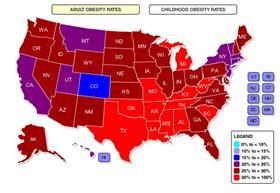
Adult obesity rates have grown once more in the US, according to the latest annual report on the state of the country's health from the Trust for America's Health (TFAH) and the Robert Wood Johnson Foundation (RWJF), 'F as in Fat: How Obesity Threatens America's Future 2011'.
The report revealed that adult obesity rates jumped in 16 states over the last 12 months and did not decline in any state, while 12 states now have obesity rates above 30 per cent – four years ago, only one state was above the 30 per cent mark.
Many patterns remain the same as last year, the report noted, with obesity rates higher in southern states, Mississippi remaining at the top of the list for the seventh year running, and Colorado registering the lowest obesity rate and maintaining its position as the only state with a rate under 20 per cent.
In addition to the annual figures, the 2011 report also examined how obesity rates have grown over the past two decades.
No state had an obesity rate over 15 per cent 20 years ago, with 38 states in total now boasting a rate above 25 per cent, growing fastest in Oklahoma, Alabama and Tennessee and slowest in Washington D.C., Colorado and Connecticut.
'Today, the state with the lowest obesity rate would have been the highest in 1995,' explained Jeff Levi, executive director of TFAH. 'There was a clear tipping point in our national weight gain over the last 20 years, and we can't afford to ignore the impact obesity has on our health and corresponding health care spending.'
New data in the report outlined the soaring levels of health issues such as diabetes and high blood pressure, while also outlining racial and ethnic figures and the difference between high and low income groups.
'The information in this report should spur us all – individuals and policymakers alike – to redouble our efforts to reverse this debilitating and costly epidemic,' said Risa Lavizzo-Mourey, president and CEO of RWJF. 'Changing policies is an important way to provide children and families with vital resources and opportunities to make healthier choices easier in their day-to-day lives.'
To ease the obesity epidemic, the report outlines a number of recommendations for policymakers, such as protecting the Prevention and Public Health Fund, implementing the Healthy, Hunger-Free Kids Act, implementing the National Physical Activity Plan and restoring cuts to vital programmes.
'Creating healthy environments is key to reversing the obesity epidemic,particularly for children,' remarked Lavizzo-Mourey. 'When childrenhave safe places to walk, bike and play in their communities, they're more likely to be active and less likely to be obese. It's the same withhealthy food: when communities have access to healthy affordable foods,families eat better.'



